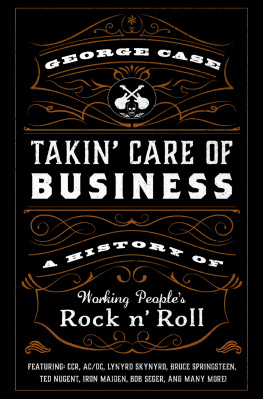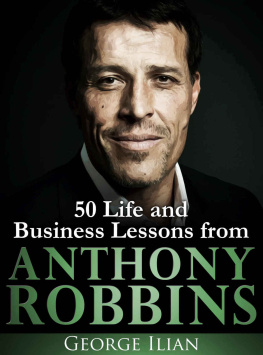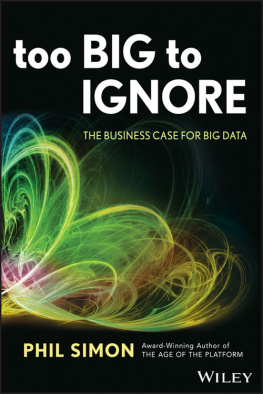George Case - Takin Care of Business
Here you can read online George Case - Takin Care of Business full text of the book (entire story) in english for free. Download pdf and epub, get meaning, cover and reviews about this ebook. year: 2021, publisher: Oxford University Press, genre: Politics. Description of the work, (preface) as well as reviews are available. Best literature library LitArk.com created for fans of good reading and offers a wide selection of genres:
Romance novel
Science fiction
Adventure
Detective
Science
History
Home and family
Prose
Art
Politics
Computer
Non-fiction
Religion
Business
Children
Humor
Choose a favorite category and find really read worthwhile books. Enjoy immersion in the world of imagination, feel the emotions of the characters or learn something new for yourself, make an fascinating discovery.
- Book:Takin Care of Business
- Author:
- Publisher:Oxford University Press
- Genre:
- Year:2021
- Rating:3 / 5
- Favourites:Add to favourites
- Your mark:
- 60
- 1
- 2
- 3
- 4
- 5
Takin Care of Business: summary, description and annotation
We offer to read an annotation, description, summary or preface (depends on what the author of the book "Takin Care of Business" wrote himself). If you haven't found the necessary information about the book — write in the comments, we will try to find it.
George Case: author's other books
Who wrote Takin Care of Business? Find out the surname, the name of the author of the book and a list of all author's works by series.
Takin Care of Business — read online for free the complete book (whole text) full work
Below is the text of the book, divided by pages. System saving the place of the last page read, allows you to conveniently read the book "Takin Care of Business" online for free, without having to search again every time where you left off. Put a bookmark, and you can go to the page where you finished reading at any time.
Font size:
Interval:
Bookmark:


Oxford University Press is a department of the University of Oxford. It furthers the Universitys objective of excellence in research, scholarship, and education by publishing worldwide. Oxford is a registered trade mark of Oxford University Press in the UK and certain other countries.
Published in the United States of America by Oxford University Press
198 Madison Avenue, New York, NY 10016, United States of America.
George Case 2021
All rights reserved. No part of this publication may be reproduced, stored in a retrieval system, or transmitted, in any form or by any means, without the prior permission in writing of Oxford University Press, or as expressly permitted by law, by license, or under terms agreed with the appropriate reproduction rights organization. Inquiries concerning reproduction outside the scope of the above should be sent to the Rights Department, Oxford University Press, at the address above.
You must not circulate this work in any other form and you must impose this same condition on any acquirer.
Library of Congress Cataloging-in-Publication Data
Names: Case, George, 1967 author.
Title: Takin care of business : a history of working peoples rock n roll /
by George Case.
Description: New York : Oxford University Press, 2021. |
Includes bibliographical references and index.
Identifiers: LCCN 2020032881 (print) | LCCN 2020032882 (ebook) |
ISBN 9780197548813 (hardback) | ISBN 9780197548820 (epub)
Subjects: LCSH: Rock musicSocial aspectsHistory20th century. |
Working classAttitudesHistory20th century.
Classification: LCC ML3918.R63 C39 2021 (print) |
LCC ML3918.R63 (ebook) | DDC 781.66086/23dc23
LC record available at https://lccn.loc.gov/2020032881
LC ebook record available at https://lccn.loc.gov/2020032882
DOI: 10.1093/oso/9780197548813.001.0001
Forget your lust for the rich mans gold.
All that you need is in your soul.
Lynyrd Skynyrd, Simple Man
Rich man, poor man, beggar man, thief,
Aint got a hope in hellthats my belief.
AC/DC, Sin City
Rock, having evolved among the poor, and appealing to the young before they learned to cooperate, seemed the music of those who could not or would not take part in the orderly business of society. It flowed through the air, straight to the nerves, immune to the settling influence of any status quo. It appeared to have great liberating potential: all those people, moving in bliss to the same beat, might accomplish anything.
Mark Crispin Miller, Where All the Flowers Went
The Fender Stratocaster was the instrument favored by celebrated rock performers including Buddy Holly, Eric Clapton, and the African American genius Jimi Hendrix. Hendrix, who died in 1970 at age twenty-seven, was the best-known exponent of the psychedelic sound, a musical style of spacey electronic noises and surrealist lyrics conducive to the hallucinatory perceptions of listeners experiencing the effects of marijuana and LSD. Hendrix, Clapton, Holly, and other players of the classic Strat were also countercultural heroes, whose lives and work had aroused much suspicion among older people for the provocations of their songs and the rebellious implications of their fame. The futuristic cutaways and curves of the Stratocaster, first marketed in 1954, had long been associated with the racial and moral upheavals that had transformed society through the last half of the twentieth century. Yet here was the guitars outline being employed to advertise the official ascendancy of a man who promised to Make America Great Againor, to his opponents, threatened to turn back the clock on decades of hard-won social progress.
In the weeks leading up to Julys convention, the Trump campaign had also played a number of classic rock tunes at the candidates increasingly well attended and increasingly controversial rallies. Through representatives, many of the artists issued cease-and-desist notices requesting that their songs not be used at such gatherings. Among the acts whose work had sounded out over venues full of baseball-hatted, media-hating, Hillary Clintonloathing Trump supporters were Aerosmith (Dream On), Queen (We Are the Champions), Neil Young (Rockin in the Free World), the Beatles (Here Comes the Sun), and the Rolling Stones (Start Me Up and You Cant Always Get What You Want). That the performersmost of them veterans of drug busts and other debaucheries, and several not even American citizenswould be embarrassed by their appropriation by the Republican upstart was hardly surprising. Less noticed, though, was the remarkable fact that Republicans were celebrating their upstart ascendancy to the accompaniment of classic rock n roll.
What had happened? How had the roiling wave of conservative American populists co-opted the iconography of sex, drugs, and rock music? Or was conservative populism now expressed through electric guitars, and had the co-optation gone the other way?
One possible clue to those puzzles lies in a particular strain of rock n roll itself. With the form now several decades old, spanning several generations of fans and an entire planet of audiences, numerous genre subcategories have emerged: heavy metal, punk, new wave, alternative, folk, and even smaller offshoots within each, like death metal, grindcore, emo, new romantic, power pop, and on and on. Among the most enduring of these tangents is the music that emerged in the late 1960s as a response to the kaleidoscopic indulgences of psychedelia and the acoustic introspections of folk-schooled singer-songwriters. This work maintained the volume and energy of electric rock but coupled it with a down-to-earth fatalism that over the next twenty years and down to our own era has proven enormously appealing to a major segment of the entertainment marketand also, perhaps, to a crucial segment of the electorate in Western nations.
That fragmentation of the listening public, no less than of the artistic choices available to the public itself, might be another explanation of the merging of rock sound and imagery with Republican platforms, as seen in Cleveland in 2016. By the early 1970s, rock n roll had become so popular that scarcely any young person would admit to rejecting the entire medium on general principles; they might eagerly approve of one band but scornfully dismiss another appearing on the same bill. Conversely, the vast baby boom cohort that comprised rocks commercial base was so populous that few in the music industry would present any new act as a one-size-fits-all product. Everyone under a certain age liked rock, but not everyone liked it for the same reasons. Instead, managers, promoters, record company executives, and music writers tried to identify different areas of generational, regional, or cultural preference, just as distinct generations, regions, and subcultures began to understand and articulate what their own preferences were.
The particular preference of a particular audience, it emerged, was for the rock n roll music considered in this book. This ranged from the homespun urgency of Creedence Clearwater Revival to the good-time oafishness of Ted Nugent, Grand Funk Railroad, and Black Oak Arkansas; from the New England snarl of Aerosmith to the heartland grit of Molly Hatchet, Bachman-Turner Overdrive, and the Texas blues of ZZ Top; from the raspy earnestness of Bob Seger and George Thorogood to the more nuanced proletarianism of Bruce Springsteen and John Mellencamp; from the overseas attitude of Bad Company, Nazareth, Thin Lizzy, Foghat, and Motrhead to the twin titans of the denim demographic, Australias AC/DC and the unrepentant American southerners Lynyrd Skynyrd. All the artistsapolitical but anti-elitist, socially tolerant but sternly ethical, products of both international uprising and local loyaltyprovided the anthems of a young working-class contingent that has since grown into a maligned and misunderstood division of postindustrial society.
Font size:
Interval:
Bookmark:
Similar books «Takin Care of Business»
Look at similar books to Takin Care of Business. We have selected literature similar in name and meaning in the hope of providing readers with more options to find new, interesting, not yet read works.
Discussion, reviews of the book Takin Care of Business and just readers' own opinions. Leave your comments, write what you think about the work, its meaning or the main characters. Specify what exactly you liked and what you didn't like, and why you think so.











